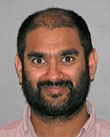Cornell sustainability center hiring researchers to explore new frontiers of climate change
By Krishna Ramanujan

In an effort to make Cornell "a major player in dealing with the challenge of climate change for society," the Cornell Center for a Sustainable Future (CCSF) will help hire three to five faculty members with expertise in climate change-related research.
They and their colleagues could help address a host of pressing challenges springing from a changing climate, from poverty issues to calculating the costs of adaptation -- and knowing when to start spending for such infrastructure projects as reinforcing sea walls against the expected rise in ocean levels.
The new researchers will be aided by CCSF faculty focus groups that will identify key gaps and needs to strengthen Cornell's leadership in sustainability. The first of these focus groups will address climate change. Other future focus groups might address such issues as ethics and governance in sustainability and alternative energy, said Anurag Agrawal, CCSF associate director and associate professor of ecology and evolutionary biology.
The center will follow a recruitment model used by Cornell's New Life Sciences Initiative, which, rather than meeting the needs of a single department, primarily addresses the interests of the larger university community and beyond, said Agrawal. At the same time, departments and colleges will be involved in developing job descriptions and recruitment. Chosen candidates' specific expertise will ultimately determine the most appropriate home department.
CCSF has already initiated searches for two new scientists, who are expected to start in 2009. Both positions will focus on land-atmosphere interactions, with one emphasizing terrestrial biogeochemistry and the other, atmospheric science. The land-air exchange of such greenhouse gases as carbon dioxide and methane is one of the frontiers of climate science, according to plant ecology professor David Wolfe, chair of a climate change focus group under CCSF's recruitment umbrella. In the future, Wolfe's group will explore needs, department interests and possible new hires in the humanities, social sciences and engineering whose work relates to climate change.
The center, which is funded by the Office of the Provost, will contribute to start-up costs and bridging funds, which could include salary for a new recruit's first year or two; after that, his or her home department will be responsible for salaries and other costs.
"Given the tough economic times we are in, university initiatives such as CCSF-facilitated faculty hires are expected to help Cornell continue to grow and maintain worldwide leadership in the most pressing areas of sustainability research," said Agrawal.
CCSF's main goals are to encourage interdisciplinary sustainability-related research through Academic Venture Fund awards; to create teams to address complex issues like poverty alleviation or alternative energy through external grants; and to hire and retain faculty.
Media Contact
Get Cornell news delivered right to your inbox.
Subscribe